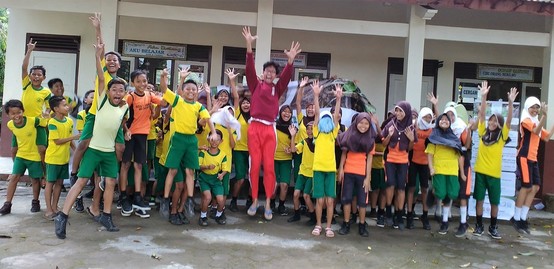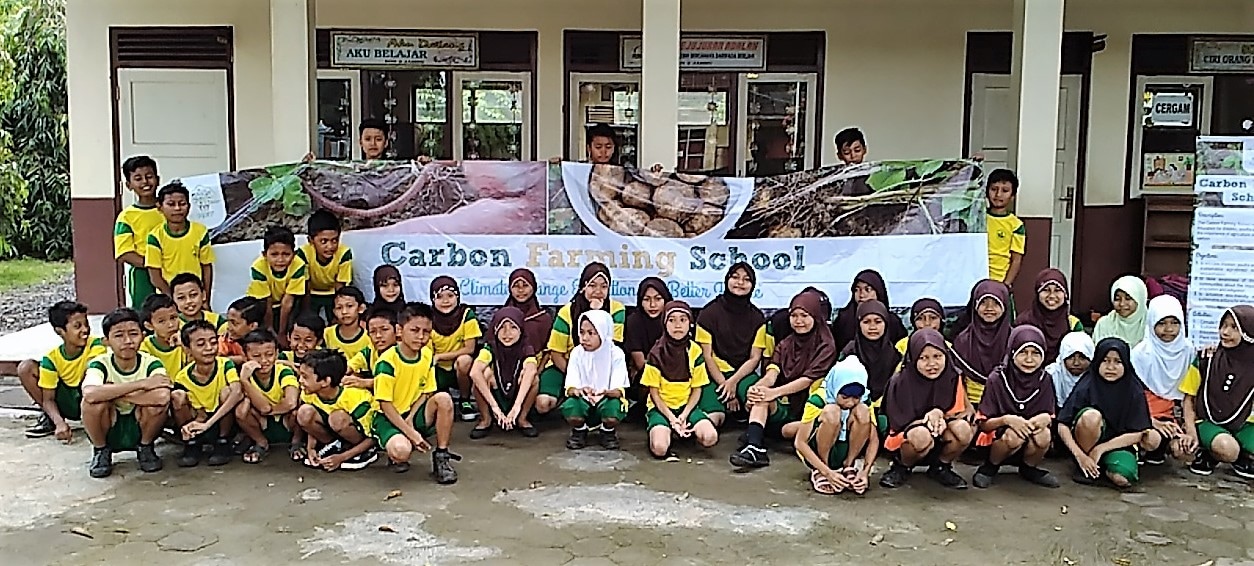Sandwatchers “carbon farming” in Indonesia

Indonesia, a very biodiverse country with three large rainforests, is named as the world’s fifth largest emitter of greenhouse gases. This reputation propelled the Indonesian government to internationally pledge to reduce 29% of its greenhouse gas emissions by 2030. To contribute to implementing this pledge, Indonesian youth have pledged to assist with some climate change initiatives.
Small and large action plans can all contribute. Starting with the Climate Smart Forestry, the Indonesian Green Action Forum (IGAF) was challenged to help accelerate the Indonesian commintment on greenhouse gas emission reduction. We are grateful to the SAYEN Handprint Challenge Program Grant for their help. After the program period ended, IGAF confronted a problem due to a lack of financial assistance causing delays in sustaining the project. However, this did not inhibit the zeal of IGAFers in mitigating climate change. Instead they sustained the project on a smaller scale via elementary schools. This year the project has a new title of Carbon Farming School.
Climate Smart Forestry leans more on mitigating climate change via forest conservation, whereas Carbon Farming School is tacjkles climate change by integrating education and agro-forest activities. The major intent of both projects is to find climate change solutions. Most of the projects’ participants are children, youths, and local communities. As a brief explanation, the Carbon Farming School project educaties students and local communities on the importance of the agro-forestry sectors for climate change solutions; and for enacting those initiatives on the ground. The project also seeks to contribute to Sustainable Development Goals 13 and 15. This project is now financially supported by the United Nations Environment Programme (UNEP) Eco-Peace Leadership Center (EPLC) and Yuhan Kimberly Ltd. The project will be carried out for a year in Jepara and Bogor Regency, Indonesia.
The ultimate goal of the project is not only to persuade more than 1,000 participants to get involved to the project but also provide a means to increase public awareness of climate change problems and solutions. The project will be in form of a school for both students (elementary school to universities) and local communities. The proposed eco-activities comprise education, agroforestry, biocomposiing, eco-activities and games, and carbon stock measurement. For full details of the project, see: https://www.facebook.com/IndonesianGreenActionForum/.
By Achmad Solikhin, IGAF/Sandwatch Indonesia
Small and large action plans can all contribute. Starting with the Climate Smart Forestry, the Indonesian Green Action Forum (IGAF) was challenged to help accelerate the Indonesian commintment on greenhouse gas emission reduction. We are grateful to the SAYEN Handprint Challenge Program Grant for their help. After the program period ended, IGAF confronted a problem due to a lack of financial assistance causing delays in sustaining the project. However, this did not inhibit the zeal of IGAFers in mitigating climate change. Instead they sustained the project on a smaller scale via elementary schools. This year the project has a new title of Carbon Farming School.
Climate Smart Forestry leans more on mitigating climate change via forest conservation, whereas Carbon Farming School is tacjkles climate change by integrating education and agro-forest activities. The major intent of both projects is to find climate change solutions. Most of the projects’ participants are children, youths, and local communities. As a brief explanation, the Carbon Farming School project educaties students and local communities on the importance of the agro-forestry sectors for climate change solutions; and for enacting those initiatives on the ground. The project also seeks to contribute to Sustainable Development Goals 13 and 15. This project is now financially supported by the United Nations Environment Programme (UNEP) Eco-Peace Leadership Center (EPLC) and Yuhan Kimberly Ltd. The project will be carried out for a year in Jepara and Bogor Regency, Indonesia.
The ultimate goal of the project is not only to persuade more than 1,000 participants to get involved to the project but also provide a means to increase public awareness of climate change problems and solutions. The project will be in form of a school for both students (elementary school to universities) and local communities. The proposed eco-activities comprise education, agroforestry, biocomposiing, eco-activities and games, and carbon stock measurement. For full details of the project, see: https://www.facebook.com/IndonesianGreenActionForum/.
By Achmad Solikhin, IGAF/Sandwatch Indonesia
